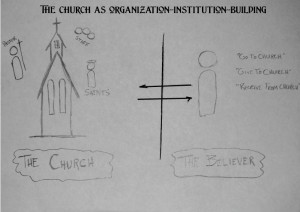
Before I post my podcast of this week’s sermon, I thought I’d post some of my study notes and thinking that went behind it this week. I really enjoyed studying 1 Corinthians 1 this week, it’s a blessing of my job that I am expected to do this, and it was an unexpected blessing and surprise the way it worked out this week. To be honest, I did not expect much from 1 Corinthians 1. Anyway, here are some thoughts that went behind this week’s sermon.
Thoughts behind the sermon
1 Corinthians 1:1-9
Paul, called to be an apostle of Christ Jesus by the will of God, and our brother Sosthenes,
2 To the church of God that is in Corinth, to those who are sanctified in Christ Jesus, called to be saints, together with all those who in every place call on the name of our Lord Jesus Christ, both their Lord and ours:
3 Grace to you and peace from God our Father and the Lord Jesus Christ.
4 I give thanks to my God always for you because of the grace of God that has been given you in Christ Jesus, 5 for in every way you have been enriched in him, in speech and knowledge of every kind— 6 just as the testimony of Christ has been strengthened among you— 7 so that you are not lacking in any spiritual gift as you wait for the revealing of our Lord Jesus Christ. 8 He will also strengthen you to the end, so that you may be blameless on the day of our Lord Jesus Christ. 9 God is faithful; by him you were called into the fellowship of his Son, Jesus Christ our Lord.
The first thing that stood out to me in reading these verses was the recurrence of the word, “call.” It is found in verse 1, Paul, called to be an apostle, verse 2 where they are called to be saints and where they call upon the name of the Lord, and verse 9, by God they were called. As it turns out, the Greek word translated into call is the same for all, except when they call upon God. This means that there is a distinction between those occurrences, but that makes sense. The focus is upon God calling people for 3 of the 4 and those are the three occurrences of the same Greek word (kaleo).
There is an important structural element to notice in the first two verses.
Verse 1 – From: Paul, called to be an apostle…
Verse 2 – To the church of God in Corinth (note the modifier “of God” comes before “in Corinth,” they are to be first the church of God, which is emphasized by the word order, but located in Corinth)
To those sanctified in Christ Jesus, called to be saints, with everyone everywhere…
The letter is addressed “to the church of God in Corinth…” and also “to those who are sanctified…” There does not seem to be a distinction between the two, but rather that they are two descriptions of the people who are the recipients of the letter. So, let’s look at that:
“To the church” –church is the Greek word, ecclesia
Which means: Assembly, gathering of citizens;
The NT emphasis on a gathered community, also on their being the newly constituted people of God
The ecclesia are a called community
Ecclesia is derived from the greek word, “Kaleo”
Kaleo – meaning “called to something,” divinely appointed
Verse 1 – Paul is called to be an apostle
Verse 2 – “called to be saints”
Verse 9 – “by Him you were called”
This was a cool connection to make, because it tied in the ecclesia with the theme of calling that I had noticed earlier. The ecclesia is a called community, in fact, they are God’s called community. They are then described further.
“To those who are sanctified” – means to be made holy, from the same root as “holy”
Word for holy is “Hagios” – holy, sanctified
Holy means set apart, separate from the profane, dedicated to God, purified, free from guilt of sin. One way to think about it is being set aside as in the temple priests or vessels.
The term for “holy” is also found behind the word translated as “saints” in verse 2. In it is the same root word, so a better translation would actually be, “holy ones of God.”
“To those called to be the holy ones of God” – this is how Paul addresses the church (ecclesia).
Stopping there we have something interesting in just the first couple of verses, which I didn’t expect, but had fun thinking about. What does Paul mean when he speaks of “the church?” What do we mean when we think of “the church?” Are they two different things? In just the first few verses of 1 Corinthians, Paul addresses the ecclesia, and by that is meant a gathering or a community of God’s people. They are God’s people because they are called, divinely appointed by God, but also because they have “called upon the name of the Lord Jesus Christ” (verse 2). The community is defined by commitment to Jesus and calling by God. They are also called for a purpose which is to be the holy ones of God. The community is to be set apart for service to God. But they are not doing this in themselves, they have their sanctification in Christ Jesus, and it is God who will strengthen them until the end. Indeed, it is God who has gifted them in this community with spiritual gifts and knowledge. God is bringing about something in them. This is, I think, the picture of “church” that Paul has in mind. How do we treat “church?”
One thing that came to mind in studying and thinking about this last week was the way we talk about church. “I am going to church,” which means I am going to a building, and usually means I am going to a building for a worship service. It may also mean that I am going to a building to serve there, as in, “I am helping out at church.” One consistent thread in this is the distinction between the believer and the church. I think this is one very problematic aspect of North American Christianity. The believer can be a believer in Christ on his or her own and enter into a relationship with a church that is more shaped by our consumer culture than scripture. We use words like “church shopping,” and it is exactly what we mean. I, the individual believer, am not a part of something, but rather I am looking for something that best meets my needs. This means we treat the church in a very similar way that we treat Walmart, or a movie theatre, for example. In contrast, the church is not a place or an organization for Paul, it is the community of people who have been called by God and who have called upon the name of the Lord Jesus Christ. I think it is fair to say from 1 Corinthians, that Paul does not share our concept of the individual believer apart from “the church” nor does he share our institutional concept of “the church.” The implications of this are numerous and challenging, both to the individual believer and to the particular communities called “churches” that are tempted to see themselves as institutions.
I think I have demonstrated above that Paul uses “ecclesia” which we translate as “church” in 1 Corinthians differently than we do many times, but there is a deeper problem afoot, I think. If the church is a service based institution where its constituents are consumers of a spiritual or educational good, then that means that the church becomes the answer to what people need or are seeking. This means that the church, in some sense, becomes the savior. Again, this is consistent with our consumer culture way of viewing things. If you only have this particular car, life will be better – have you noticed that they don’t sell cars, they sell an image of who drives that car, of what you become when you own the car? Is the church meant to be savior?
Again, 1 Corinthians is helpful because that particular church was messed up. They were not a good community, even with all their spiritual gifts. The people at Corinth, that community, were not the saviors. They were not the ones who were solving people’s deepest needs. But they were called into the work of the Lord, so what exactly is that? The first priority has to be our focus and faith in Jesus Christ. It is Jesus who is the savior, and through Jesus that they would be sanctified. That means that the church is a community of God’s people who call upon the name of the Lord for salvation. The church isn’t the answer, Jesus is the answer. The church is the community of people who are relying upon Jesus. It is only from this relationship then, that the people actually do experience change from the Holy Spirit, but that change happens because of Christ, by the Holy Spirit, and in community.
So, with those thoughts and information, I had to think about how to enter into that train of thought through a sermon. As you hear the beginning of the message you’ll know what was behind starting it that way.
There are other things I found during study that I wasn’t able to cover in the sermon. If I get a chance this week I’ll elaborate on some of those. It can be a difficult process some weeks to decide what not to say, but in the interest of have some sort of focus and of avoiding a 3 hour lecture, it is appropriate to include some things and leave other directions out.


It would appear that the gospel of Thomas conveyed the same message as Corinthians. The Kingdom of Heaven is not in a building it is within each of us
Hi Timothy, thanks for stopping by the blog and commenting.
I would actually suggest that there are some sharp distinctions between the message of 1 Corinthians (and the rest of the New Testament) and the Gospel of Thomas. I’ll give a couple of specifics, but this won’t be as in depth as it could be since I don’t have enough time to thoroughly research this. So here goes:
1. The message I gave Sunday especially focused on 1 Corinthians 1:2 and the manner in which Paul referred to his audience, “ecclesia.” The term ecclesia is translated as church and, as I spoke about Sunday, refers to the community of people who call upon the name of Jesus; God’s people. Notice, the ecclesia is not within them, but rather it is descriptive of what they are as a community. In contrast, you brought up “the Kingdom of Heaven,” which is a different concept, and the way the Kingdom of Heaven is used in the Gospel of Thomas is different than the way it is used in the New Testament. Here is an example: in verse 3 of the Gospel of Thomas, it refers to the Kingdom being not in the heaven, not in the sea, but “within you and outside you.” In contrast, the Kingdom of heaven in the New Testament is the Kingdom of God’s reign, it is something that “came near” in the ministry of Jesus (Matthew 4:17), it is for those who are rich in faith, but tend to be poor in this world (James 2:5), it is entered into (1 Thessalonians 2:12). The ecclesia then are distinct from the Kingdom of Heaven, or the Kingdom of God, but we are called to be citizens of this Kingdom and therefore ambassadors of this other way of living and being (2 Corinthians 5)
2. Another striking difference between the first verses of 1 Corinthians and the Gospel of Thomas as a whole is the treatment of wisdom or knowledge in each. The Gospel of Thomas is a collection of the sayings of Jesus, some of which bear a resemblance to teachings of Christ found in the canonical gospels, some of which do not, and some that contradict each other. Thomas is considered a gnostic gospel and what is meant by that is that it posits a sort of salvation through knowledge, and therefore the knowledge of Jesus is conveyed through the writings in order to show you the way of salvation – learning these sorts of things. This knowledge or wisdom has been secret and is being disclosed through this particular gospel – so you get verses such as: verse 62 where Jesus states that he will disclose his mysteries to those who are worthy of his mysteries, or verse 1 which states that whoever “discovers” the interpretations of these sayings will not taste death. In other words, if you gain this understanding, then you will live. In contrast, knowledge in 1 Corinthians is a gift given freely by God (see 1:4) and it is the ways in which that knowledge was used to damage community that Paul is challenging in the letter. The knowledge doesn’t save. Salvation isn’t found in what you know, but rather who you know, in Jesus Christ.
If you’ve humored me this long, thank you. I did want to take some time, however, to stress these contrasts because the world view put forth by the Gospel of Thomas is very different than that of the Christian scriptures, and I think that is important for me to demonstrate as a pastor with my teaching responsibilities. Thanks again for your interest and if you have any questions on what I’ve written fire away.